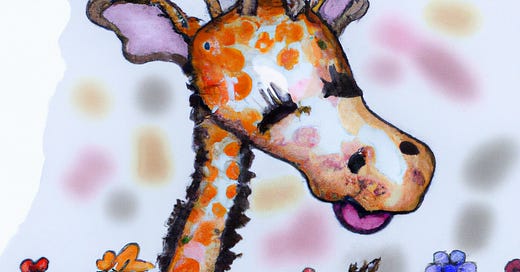Some people talk about pleasure as if they’re embarrassed by it.
I’ve written about pleasure before, and I still notice that for whatever reason (repressive parents, a history of trauma, a religious upbringing that treated pleasure as sinful, etc.), so many of us think of physical pleasure as if it’s something to be indulged only sparingly. We think that we’re unworthy and underserving, or that we need to cautiously apportion the appropriate amount of pleasure lest we run out of our given allotment (or worse, tempt the evil eye).
Many people talk about pleasure as if it comes with a specific threshold, and beyond that bound, any excess mirth is considered crass or undignified. Society has coined innumerable words to express its disdain for these pleasure seekers: libertine, stoner, dionysian, epicurean, debauched, hedonist, junkie, carnal, promiscuous, addict, unprincipled, profligate, animalistic, and so forth. Nearly all of these terms come with some degree of contempt, pity, scorn, or disgust — but many also often come with a twinge of envy as well.
After all, anyone who levies the critique that so-and-so is a hedonist must implicitly acknowledge that so-and-so is probably having a fair bit of fun (in all likelihood, more fun than the person doing the critiquing). For too many reasons to list, society has demonized pleasure-seekers, castigating them as lewd, lubricious, lecherous, and lascivious.
But I posit that they are also perceived as lucky, too.
Why, after all, would we go to such great lengths to express our contempt and ridicule for the folks among us who delight in the pleasures that the earth affords us? Is our vitriol not a paltry disguise for what is really an expression of jealousy? Perhaps we invent words to lance those we feel threatened by, hiding our desire to share in those delights (and our concomitant insecurity at perhaps not being able to attain them as richly) behind a wall of disapproval and disapprobation. If we felt confident in our own ability to revel in the ecstasies that our bodies are capable of feeling just as well as those on whom we cast our stones, why would we not join them in their revelry?
One answer that explains this prudish, envious, condemning behavior is known as “the upper limit problem.” Originally coined by the psychologist Gay Hendricks, the problem refers to a tendency we all have (to one extent or another) to curb our enthusiasm and stifle our joy when we believe we might be overstepping the upper limit of the pleasure we’re “allowed” to feel. The upper limit is the point beyond which we believe any amount of pleasure is somehow unmerited, wrong, or otherwise undeserved.
Each of our upper limits is different, and they could have been ingrained during childhood from a seemingly innocuous moment, such as when a teacher told us to not laugh so loud, or when a babysitter told us that we couldn’t have a second cookie. We unwittingly internalize that there are limits to our joy, and this carries with us into adulthood.
But have you heard the good news? There is no such thing as the upper limit!
There is no one determining the amount of fun and happiness you can or cannot experience. No one is going to admonish you for having a second cookie, or punish you for experimenting with kink, or threaten hellfire upon you for doing MDMA. You will not get in trouble for seeking pleasure (unless you get caught doing something illegal), and anyone who tells you otherwise is mistaken. Ultimately, you are the arbiter of the joy you experience, and if you don’t jealously guard that rightful autonomy, others will try to convince you that you’re being reckless, irresponsible, or selfish. Remember, they’re just jealous!
If you don’t wrest your own pleasure from the resentful prudes among us, you let them dictate your life and you forfeit control over your own happiness. You can’t surrender to shame or minimize yourself so that the envy of others won’t burn as brightly. As Marianne Williamson wrote, “there’s nothing enlightened about shrinking so that other people won’t feel insecure around you.” In the end, it’s not about them, it’s about you and your relationship with your divinely ordained capacity to feel good. Celebrate your god-given abilities and pursue your pleasure with abandon!
Who knows? Maybe you’ll inspire others along the way!




